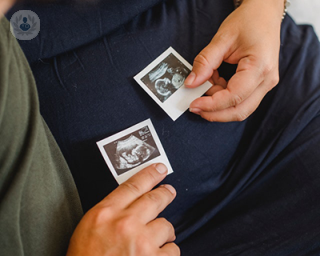What is egg freezing?
Egg freezing, or oocyte cryopreservation, is a method of preserving a woman’s eggs, enabling her to have the chance of having a baby in the future.
As women get older, they typically produce fewer eggs, and often the viability of the eggs also falls, meaning that the chances of conceiving naturally also decrease. Freezing eggs at a younger age, and using them later can provide a better chance of conception.

Why would you do it?
Freezing your eggs is a good option for patients who have a medical condition or are taking medication which affects fertility, such as cancer. You might also choose to freeze your eggs (elective egg freezing) simply because you are concerned that your fertility is declining, but you have not found the right partner or are not currently ready to have a child, but think you may want one in the future.
Other possible candidates include members of the Armed Forces, or similar situations where severe injury or even death is a risk, and those planning to have a sex change operation.
What does egg freezing involve?
Egg freezing begins the same way as IVF – this normally involves the patient taking fertility drugs to temporarily boost egg production and maturation. The eggs are then collected by doctors while the patient is sedated. Around 15 eggs are taken from most patients, but it may be less, depending on fertility.
Instead of mixing the eggs with sperm, they are mixed with a cryoprotectant (freezing solution). This will protect the eggs during the freezing process. The freezing itself is done either by fast freezing (vitrification) or slow cooling, after which they are stored in liquid nitrogen.
The maximum storage time is normally 10 years, but in certain situations the eggs can be stored for up to 55 years, or, if the patient wants, less than 10.
When the woman wants to use her eggs, they are thawed, and then fertilised. Standard IVF is not usually used, as eggs that have been frozen tend to have a tough outer coating, which sperm find more difficult to penetrate. Instead, a procedure called intracytoplasmic sperm injection (ICSI) is often used, which involves a skilled embryologist injecting a sperm directly into each egg, maximising the chance of fertilisation.
Success
It is difficult to say how successful egg freezing is, as the number of women who do it is currently very low. Oocyte cryopreservation is a relatively new and quickly changing field, with new advances being made all the time, but with few studies into its reliability. If you are considering freezing your eggs, choose an experienced clinic with a high success rate with patients.
11-13-2012 10-18-2023Egg freezing
Miss Kate Maclaran - Obstetrics & gynaecology
Created on: 11-13-2012
Updated on: 10-18-2023
Edited by: Sophie Kennedy
What is egg freezing?
Egg freezing, or oocyte cryopreservation, is a method of preserving a woman’s eggs, enabling her to have the chance of having a baby in the future.
As women get older, they typically produce fewer eggs, and often the viability of the eggs also falls, meaning that the chances of conceiving naturally also decrease. Freezing eggs at a younger age, and using them later can provide a better chance of conception.

Why would you do it?
Freezing your eggs is a good option for patients who have a medical condition or are taking medication which affects fertility, such as cancer. You might also choose to freeze your eggs (elective egg freezing) simply because you are concerned that your fertility is declining, but you have not found the right partner or are not currently ready to have a child, but think you may want one in the future.
Other possible candidates include members of the Armed Forces, or similar situations where severe injury or even death is a risk, and those planning to have a sex change operation.
What does egg freezing involve?
Egg freezing begins the same way as IVF – this normally involves the patient taking fertility drugs to temporarily boost egg production and maturation. The eggs are then collected by doctors while the patient is sedated. Around 15 eggs are taken from most patients, but it may be less, depending on fertility.
Instead of mixing the eggs with sperm, they are mixed with a cryoprotectant (freezing solution). This will protect the eggs during the freezing process. The freezing itself is done either by fast freezing (vitrification) or slow cooling, after which they are stored in liquid nitrogen.
The maximum storage time is normally 10 years, but in certain situations the eggs can be stored for up to 55 years, or, if the patient wants, less than 10.
When the woman wants to use her eggs, they are thawed, and then fertilised. Standard IVF is not usually used, as eggs that have been frozen tend to have a tough outer coating, which sperm find more difficult to penetrate. Instead, a procedure called intracytoplasmic sperm injection (ICSI) is often used, which involves a skilled embryologist injecting a sperm directly into each egg, maximising the chance of fertilisation.
Success
It is difficult to say how successful egg freezing is, as the number of women who do it is currently very low. Oocyte cryopreservation is a relatively new and quickly changing field, with new advances being made all the time, but with few studies into its reliability. If you are considering freezing your eggs, choose an experienced clinic with a high success rate with patients.


Do I qualify to be an egg donor?
By Dr Malini Uppal
2024-12-30
You may decide to donate your eggs because you have friends who are struggling to conceive or you just want to do something kind and make the dreams of parenthood become a reality for someone. The first thing you should find out though is whether or not you're a suitable candidate to donate. Dr Malini Uppal, a fertility specialist in Central London, offers this unique guide for those who are considering it. See more


Can I freeze my eggs after breast cancer treatment?
By Dr Muhammad Fatum
2024-12-29
Which cancers may lead to infertility in both men and women? To discuss this and more is distinguished fertility specialist, Dr Muhammad Fatum. See more


Ask a fertility expert: Egg freezing FAQs
By Dr Irfana Koita
2024-12-29
Egg freezing is one of a number of fertility preservation techniques available to couples or individuals considering delaying conception to a later date. In this article, leading fertility specialist Dr Irfana Koita expertly answers frequently asked questions about this innovative procedure. See more


A guide to egg freezing at London Fertility Clinic
By Dr Anu Chawla
2024-12-29
The road to pregnancy is not always smooth, and some women, particularly as they grow older can feel the worry and stress of feeling that their biological clock is ticking. Fortunately, egg freezing is a concept which can help to lessen the burden of these worries. We speak to renowned senior fertility specialist, Dr Anu Chawla who discusses everything you need to know about egg freezing and explains how this treatment is carried out at the London Fertility Clinic. See more
Experts in Egg freezing
-
Dr Benjamin Abramov
Fertility specialistExpert in:
- Assisted reproductive technology
- Fertility test
- Egg freezing
- Recurrent miscarriage
- Preimplantation Genetic Diagnosis
- Egg donation
-
Dr Mausumi Das
Obstetrics & gynaecologyExpert in:
- Assisted reproductive technology
- In vitro fertilisation (IVF)
- Fertility treatments
- Fertility Preservation
- Egg freezing
- Polycystic ovary syndrome (PCOS)
-
Dr Anu Chawla
Fertility specialistExpert in:
- Egg freezing
- In vitro fertilisation (IVF)
- Natural IVF
- Polycystic ovary syndrome (PCOS)
- Endometriosis
- Reproductive immunology
-
Dr Irfana Koita
Fertility specialistExpert in:
- Egg freezing
- In vitro fertilisation (IVF)
- Fibroids
- Polycystic ovary syndrome (PCOS)
- Endometriosis
- Miscarriage
-
Miss Kate Maclaran
Obstetrics & gynaecologyExpert in:
- Fertility treatments
- In vitro fertilisation (IVF)
- Egg freezing
- Infertility
- Menopause
- Polycystic ovary syndrome (PCOS)
- See all

LycaHealth Canary Wharf
LycaHealth Canary Wharf
1 Westferry Circus, Canary Wharf. E14 4HD
No existe teléfono en el centro.
By using the telephone number provided by TOP DOCTORS, you automatically agree to let us use your phone number for statistical and commercial purposes. For further information, read our Privacy Policy
Top Doctors

The Kensington Wing - Private Maternity
The Kensington Wing - Private Maternity
Chelsea and Westminster Hospital, 3rd Floor, 369 Fulham Rd., London
No existe teléfono en el centro.
By using the telephone number provided by TOP DOCTORS, you automatically agree to let us use your phone number for statistical and commercial purposes. For further information, read our Privacy Policy
Top Doctors

TFP Boston Place Fertility
TFP Boston Place Fertility
20 Boston Place, NW1 6ER
No existe teléfono en el centro.
By using the telephone number provided by TOP DOCTORS, you automatically agree to let us use your phone number for statistical and commercial purposes. For further information, read our Privacy Policy
Top Doctors
-
LycaHealth Canary Wharf
1 Westferry Circus, Canary Wharf. E14 4HD, Central LondonExpert in:
- Cardiology
- Dermatology
- Diagnostic Imaging
- Women’s health
-
The Kensington Wing - Private Maternity
Chelsea and Westminster Hospital, 3rd Floor, 369 Fulham Rd., London , Central LondonExpert in:
- Maternity care
- Ultrasound
- Pregnancy
- Multiple pregnancy
- Obstetrics and Gynaecology
- Pre-eclampsia
-
TFP Boston Place Fertility
20 Boston Place, NW1 6ER, Central LondonExpert in:
- Sperm retrieval
- Egg and embryo freezing
- Prenatal Diagnosis
- Ultrasound
- Genetic testing
- In vitro fertilisation (IVF)
- See all
- Most viewed diseases, medical tests, and treatments
- Tubal factor infertility
- PGT-A
- Complex endometriosis
- Fertility preservation
- Female infertility
- Ovulatory disorders
- Surrogacy
- PGT-M
- Menopause support
- Pelvic ultrasound







